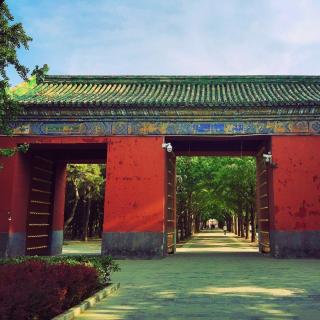發(fā)現(xiàn)為你讀英語美文電臺史鐵生《我與地壇》· 永清

介紹:
《我與地壇》
作者:史鐵生
它等待我出生,然后又等待我活到最狂妄的年齡上忽地殘廢了雙腿。四百多年里,它剝蝕了古殿檐頭浮夸的琉璃,淡褪了門壁上炫耀的朱紅,坍圮了一段段高墻又散落了玉砌雕欄,祭壇四周的老柏樹愈見蒼幽,到處的野草荒藤也都茂盛得自在坦蕩。
It had waited for me to be born, and then it had waited for me to be suddenly crippled in both legs during my wildly ambitious youth. In those four hundred years, it had been denuded of the colored glazes on the eaves of its old temple, the glorious vermilion of its gates and walls had faded, the high walls had collapsed, pieces of jade inlaid into the pillars had loosened and scattered, yet old dark green cypress trees surrounding the altar had become more and more serene, and everywhere, weeds and vines flourished with abandon.
這時候想必我是該來了。十五年前的一個下午,我搖著輪椅進(jìn)入園中,它為一個失魂落魄的人把一切都準(zhǔn)備好了。那時,太陽循著亙古不變的路途正越來越大,也越紅。在滿園彌漫的沉靜光芒中,一個人更容易看到時間,并看見自己的身影。
It was about the right time for me to come here. When the park was finally ready for me—a man at loose ends—I maneuvered my wheelchair into the park for the first time. The sun—on its ancient, unchanged path—was just growing bigger, and redder. In the still rays of light suffusing the park, it was easy for a person to see the time, and easy to see his own shadow.
自從那個下午我無意中進(jìn)了這園子,就再沒長久地離開過它。我一下子就理解了它的意圖。正如我在一篇小說中所說的:“在人口密聚的城市里,有這樣一個寧靜的去處,像是上帝的苦心安排。”
Beginning with that afternoon when I happened to go to this park, I’ve never been away from it for long. I understood at once why it was there. As I said in one story, “In a densely populated city, it’s as if God painstakingly arranged for a place as serene as this.”
兩條腿殘廢后的最初幾年,我找不到工作,找不到去路,忽然間幾乎什么都找不到了,我就搖了輪椅總是到它那兒去,僅為著那兒是可以逃避一個世界的另一個世界。
The first few years after I was crippled, I couldn’t find work: I had no future; all of a sudden, it was almost as though I couldn’t find anything. And so I wheeled myself to the park almost every day: it was another world, one where I could escape this world.
我在那篇小說中寫道:“沒處可去我便一天到晚耗在這園子里。跟上班下班一樣,別人去上班我就搖了輪椅到這兒來。園子無人看管,上下班時間有些抄近路的人們從園中穿過,園子里活躍一陣,過后便沉寂下來?!?I wrote in one story, “With no place to go, I used to spend the whole day in the park every day: other people went to work; I went to the park. It was an abandoned park. When it was time to go to work or time to go home, people took shortcuts through the park, and it became animated for a while. Afterwards, it was still.”
“園墻在金晃晃的空氣中斜切下一溜蔭涼,我把輪椅開進(jìn)去,把椅背放倒,坐著或是躺著,看書或者想事,撅一杈樹枝左右拍打,驅(qū)趕那些和我一樣不明白為什么要來這世上的小昆蟲。”
“In the dazzling golden sunlight, the park’s wall provided shade: I wheeled myself over there, put the back of the wheelchair down, and—either sitting or lying down—I read or thought. I would break off a cypress twig and drive away the insects who didn’t know any better than I did why they had been born in this world.”
“蜂兒如一朵小霧穩(wěn)穩(wěn)地停在半空;螞蟻搖頭晃腦捋著觸須,猛然間想透了什么,轉(zhuǎn)身疾行而去;瓢蟲爬得不耐煩了,累了祈禱一回便支開翅膀,忽悠一下升空了;樹干上留著一只蟬蛻,寂寞如一間空屋;露水在草葉上滾動,聚集,壓彎了草葉轟然墜地摔開萬道金光。”
“A bee like a tiny piece of mist hung on in midair; an ant was deep in thought, its head wagging and its antennae quivering, and then, all of a sudden, it must have come up with the right answer, for it turned back and scudded off; the ladybug climbed around wearily, stopped to pray for a while, and then, flapping its wings, suddenly soared to the sky; on the tree trunk there was one cicada, as lonely as an empty room; dew rolled around on the leaves of weeds, and then coalesced, weighing the leaves down until they broke into thousands of rays of golden light.”
“滿園子都是草木競相生長弄出的響動,窸窸窣窣片刻不息?!边@都是真實(shí)的記錄,園子荒蕪但并不衰敗。
“The whole park was astir with the sound of weeds, bushes, and trees growing, all shattering ceaselessly。” This was all true: the park was a wasteland, but far from going downhill.
除去幾座殿堂我無法進(jìn)去,除去那座祭壇我不能上去而只能從各個角度張望它,地壇的每一棵樹下我都去過,差不多它的每一米草地上都有過我的車輪印。無論是什么季節(jié),什么天氣,什么時間,我都在這園子里呆過。
Aside from some buildings that I had no way to enter, aside from the altar that I had no way to reach but could only gaze at from every possible vantage point, I had been under every tree in the park, and my chair’s wheel-prints were left on almost every meter of grass. I had spent time in this park in all seasons, all
大家還在聽

